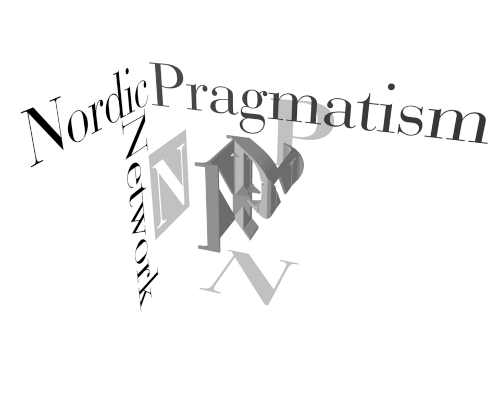Events
Future Events
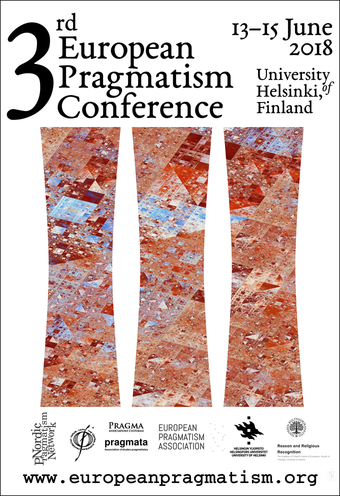 "
"
|
Helsinki, Finland, 13-15 June 2018 The third European Pragmatism Conference brings together philosophers and scientists working in pragmatism from across Europe and the world. The confernece is organized by the Nordic Pragmatism Network in collaboration with Pragmata (France), Associazione Pragma (Italy), Central European Pragmatist Forum and the European Pragmatism Association. |
Past Events
|
Berlin, Germany, 11-13 July 2017 What is the relationship between Kantian philosophy and pragmatism? The conference is organized by the Berlin Practical Philosophy International Forum in collaboration with the Philosophical Society of Finland and the Nordic Pragmatism Network. |
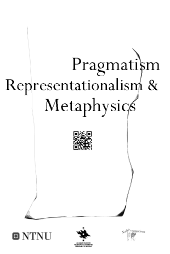
|
Helsinki, Finland, 4-5 January 2017 It has become popular to divide the pragmatist tradition into two main strands – a realist one beginning with the founder of pragmatism, Charles S. Peirce, and a constructivist one, culminating in the anti-representationalism of Richard Rorty. The aim of this workshop is to explore the anti- representationalist and expressivist strands of pragmatist thought from the pragmatist classics to the contemporary pragmatists. |
|
Helsinki, Finland, 30-31 May 2016 Originally a term for art in ontology, pluralism has become to mean an approach to cultural, ethnic and religious diversity. The philosophers and sociologists of the pragmatist tradition, beginning with William James and John Dewey, advanced forms of cultural pluralism, prefiguring the much debated multiculturalism of today. The aim of this workshop is to clarify our understanding of the concept of pluralism, its merits and potential issues. |

|
|
Helsinki, Finland, 16-17 May 2016 Wittgensteinian philosophy and pragmatism are two traditions of thought in which several interesting parallels can be discerned, regarding the problems they focus on and how, but also regarding what they are opposing. This symposium investigates themes of interconnection between Wittgensteinian and Pragmatist philosophy, and their roles in contemporary thought. |
|
Paris, France, 9-11 September 2015 The second European Pragmatism Conference brings together philosophers and scientists working in pragmatism from across Europe and the world. The confernece is organized by PRAGMATA (Association française d’études pragmatistes) in partnership with the European Pragmatism Association, The Nordic Pragmatism Network, PRAGMA (Associazione Italiana di studi pragmatisti), and CEPF (Central European Pragmatist Forum). |
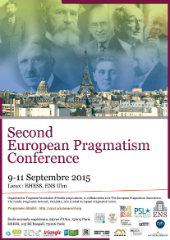
|
|
Helsinki, Finland, 17-18 November 2014 In non-American contexts, what would “American philosophy” signify and what kind of role would it play? We are thinking first and foremost of those distinctive forms of philosophy that are found in transcendentalism and pragmatism. But how far are these necessarily American? This symposium will address the role of American philosophy in both American and non-American contexts through the dialogue among international scholars (including American, Asian and European scholars). |
|
Helsinki, Finland, 30 September - 2 October 2014 In these third Nordic Lectures in Pragmatism, Robert Brandom gives an overview of his work aiming to reconceive and renew pragmatist thought by on the one hand reconnecting it with its roots in the German Idealist tradition, and on the other hand synthesizing it with analytic philosophy of language, epistemology, and metaphysics. |
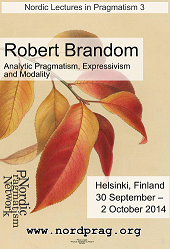
|
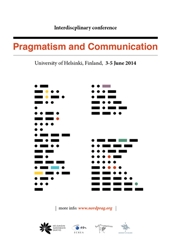
|
Helsinki, Finland, 3-5 June 2014 Matters of communication have figured prominently in pragmatist thought, and pragmatism has also directly influenced communication scholarship. What roles does ‘communication’ actually play in pragmatisms of various stripes? What are the distinctive contributions of pragmatism to our understanding and study of communication? This three-day interdisciplinary conference aims to explore these and closely connected questions. |
|
Tallinn, Estonia and Helsinki, Finland, 20-23 April 2014 The year 2014 marks the centenary of Peirce’s death in Milford, Pennsylvania, in 19 April 1914. The second installment of the Applying Peirce conference, first held in Helsinki in June 2007, brings together Peirce scholars and researchers to explore and discuss Peirce’s thought and applications in diverse fields. |
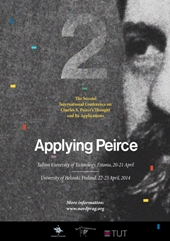
|
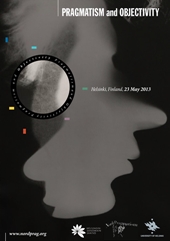
|
Helsinki, Finland, 23 May 2013 The concept of objectivity is becoming increasingly central to discussions among philosophical and social-scientific pragmatism. Pragmatists have both criticised and defended the ideal of objectivity, while several contemporary pragmatists have defended an understanding of objectivity that is inherently connected to our practices of communication and judgment. This one-day workshop explores different dimensions of the concept of objectivity from the point of view of the pragmatist tradition and present-day pragmatism. |
|
Helsinki, Finland, 20-21 May 2013 Joseph Margolis’s influence has extended to various branches and debates in philosophy. He is especially known for his systematic defense of relativism and for emphasizing the historical character of human thinking and inquiry. The conference is devoted to the different aspects of Margolis’s philosophical work and its contemporary relevance. |
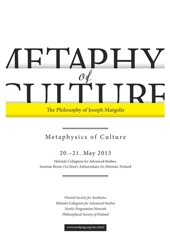
|
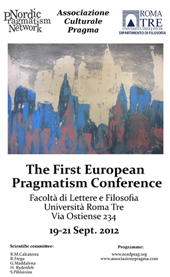
|
Rome, Italy, 19-21 September 2012 The Nordic Pragmatism Network and the Associazione Pragma jointly organize the First European Pragmatism Conference in Rome, Italy, 19-21 September 2012. The conference aims to bring together for the first time different European groups and individuals working on the tradition of pragmatism and American philosophy. |
|
Helsinki, Finland, 9-11 May 2012 In the second Nordic Pragmatism Lectures, Philip Kitcher will review John Dewey’s attempt to renew philosophy, and explore ways in which Dewey’s program might apply in the twenty-first century philosophical debates over topics in metaphysics, epistemology, ethics, social and political philosophy, and philosophy of religion. |
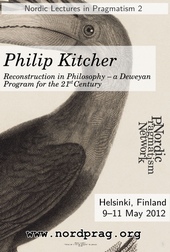
|
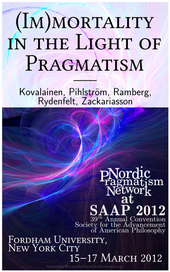
|
New York City, USA, 15-17 March 2012 A panel organized by the NPN to the SAAP annual conference of 2012 will explore the theme of (im)mortality in the writings of central classics of the pragmatist tradition as well as the pragmatist understanding of the theme’s meaning and significance. |
|
Helsinki, Finland, 12-14 September 2011 In these first Nordic Pragmatism Lectures, Huw Price presents his version of the combination of anti-representationalism and naturalism, situating his both in opposition to other forms of contemporary philosophical naturalism, and in comparison to other pragmatist and neo-pragmatist views. Price is ARC Federation Fellow and Challis Professor of Philosophy at the University of Sydney, and has recently been elected Bertrand Russell Professor of Philosophy at the University of Cambridge. |
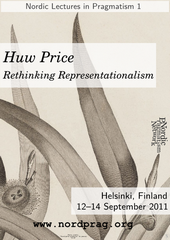
|
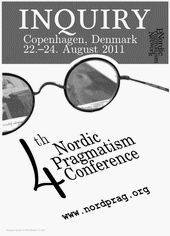
|
Copenhagen, Denmark, 22-24 August 2011 Pragmatists have often emphasized the social and biological underpinnings as well as the self-correctiveness and normativity of inquiry. How can the pragmatist notion of inquiry distinguish pragmatism from other traditions? What are the consequences of the pragmatist view to philosophical and scientific reflection in different fields? |
|
Helsinki, Finland, 6-9 June 2011 Are the many ways in which theories can be qualified as “realist” merely homonymic or is there a commitment which grounds the use of the same word? Are there any interesting connections between the debate about universals and the debate between realism and idealism? When, and how, the realism vs. idealism debate emerged, and did the realism vs. nominalism debate play any role in this emergence? |
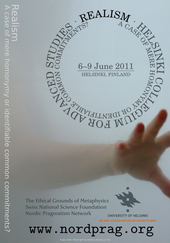
|
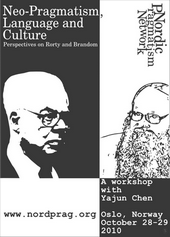
|
Oslo, Norway, 28-29 October 2010 Richard Rorty and Robert Brandom are among the most prominent contemporary philosophers who have referred to themselves as pragmatists. What are the common "pragmatist" views shared by these thinkers, and what is pragmatic or pragmatist about their neo-pragmatism? |
|
Uppsala, Sweden, 1-2 June 2010 From the pragmatist point of view, action is central to all philosophical problem-solving: philosophical issues are never unrelated to action. But what is the distinctively pragmatic understanding of action, and what are the consequences of the pragmatist view to contemporary philosophical reflection on fields such as science, religion, ethics, education and anthropology? |
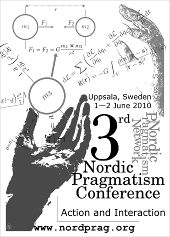
|
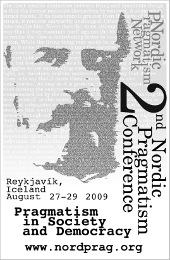
|
Reykjavik, Iceland, 27-29 August 2009 Many leading pragmatists have contributed to political debates, and some of them have had considerable influence on policy-making. Can pragmatism offer a way of diversifying political discourse by generating demands on political vocabularies of being relevant to solving real and tangible political problems? |
|
Helsinki, Finland, 19-20 May 2009 Charles Sanders Peirce was a scientist, philosopher, mathematician and one of the founders of modern logic. This symposium discusses Peirce's logical and philosophical ideas in contrast with developments in logic and analytic philosophy that simultaneously and consequently took place in Europe. |
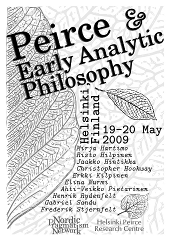
|
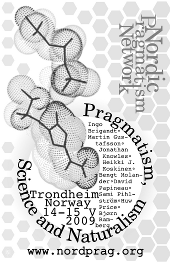
|
Trondheim, Norway, 14-15 May 2009 Naturalism is accepted by the majority of serious philosophers and scientists today. However, it can be difficult to give the doctrine non-controversial content. Could a pragmatist perspective on different human ways of conceiving of the world mediate between different points of view, especially those of natural science and common sense? |
|
Jyväskylä, Finland, 15-17 December 2008 Questions of the philosophy of religion have made a forceful return to pragmatist philosophy. But is there a pragmatist ethics of belief? And, conversely, is religious belief ethical in nature? |
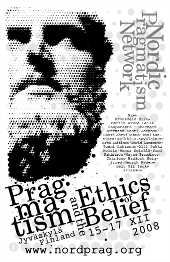
|
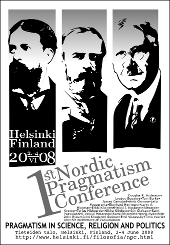
|
Helsinki, Finland, 2-4 June 2008 Philosophical pragmatism has aroused renewed interest among philosophers over the past few decades. What is the critical and constructive influence of pragmatism in science, religion, and politics? |
